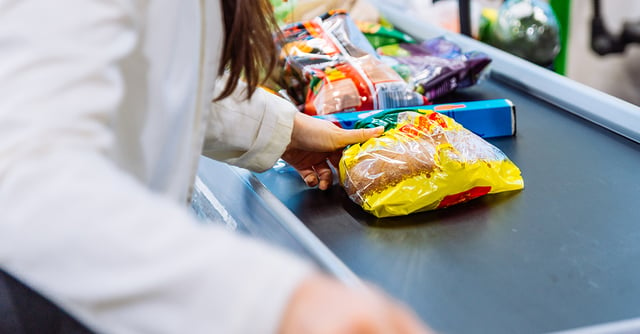Our expert voice on food, retail and hospitality supply chains, Kimberly Carey Coffin, looks at what the food sector can learn from the findings.
In developed food markets, 2020 was the first year in living memory when consumers questioned whether there would be food on supermarket shelves tomorrow. Panic buying, supply chain disruption, and queueing for access to retail spaces all became realities in the most developed global markets. There was a shift from what do we want to eat, to what do we need - and where do we go to purchase it.
Pressure on food security was a reality, outweighing for most consumers the concerns about food safety. Essential services, farms and factories continued to operate, and food was clearly ruled out as a transmission source. However, for those working in the industry, there were concerns whether the right people were present and processes effectively maintained to ensure products were safe. Would rapid, untested adaptations to supply chains and the squeeze on cashflow, compromise food safety?
Straddling the crisis were three pieces of consumer research about consumer views on food safety by LRQA's Business Assurance and Inspection Services. Two of the surveys - in Europe and the United States - were carried out in 2019 before COVID-19 hit. The third, in China, was done post-lockdown in June 2020. Each surveyed more than a thousand consumers, using a recognised research firm.
The striking finding is that the majority of respondents said they felt more worried about food safety than a year ago - even in the surveys carried out before the pandemic. In the UK, only 9.3 per cent of people felt more confident about the safety of their food compared to the year before. In the US, the figure was 7.6%. In China - post-COVID-19 - the figure was 2.5%.
In so many ways, COVID-19 has accelerated trends that were already present, and that's happened in the food sector too. If you run a farm, food retail or hospitality business take note; consumers are losing confidence. Or put another way, they are seeking reassurance from your products, your labelling, and your reputation.
That need is reflected in the main theme of this year's World Food Day, led by the Food and Agriculture Organisation of the United Nations 'Grow. Nourish. Sustain.' initiative.
Right now, what can the food industry learn from LRQA's food trends research?
For consumers, food safety goes beyond the 'use by' date
After worries about microbiological and physical contaminates in food, the second biggest concern for consumers across the world was the nutritional content of their food and the breakdown of how much fat, sugar, artificial colours and flavours are in the products they are buying. This increased focus on nutrition and wellbeing has been recognised by the industry, with action taken in response by both producers and retailers.
From an industry perspective, nutritional content does not constitute a food safety issue but is a blind spot for consumers who are increasingly looking out for the 'bad' attributes of the products they buy.
As an industry, we may not agree with this consumer perception, but producers must accept that to remain viable, understanding our role in the production of safe food through the eyes of the consumer includes prioritising products that support people's ability to live a healthy lifestyle.
Traceability is trust
Despite the complex global supply chains often involved, consumers were clear by a significant majority that they expect supermarkets, shops and restaurants to know the precise ingredients of food sold, including where and how these have been sourced in support of the claims on the labels.
Of no surprise is the increasing consumer demand for more and more information about animal welfare, ethical sourcing and organic production that can be substantiated. Survey results revealed that up to 30% of consumers were not at all confident that products labelled as organic were genuine, and on average 20% questioned if products sold as 'vegan' did really contain meat. At the same time, survey respondents in all markets indicated a sizeable distrust of the traceability information that is being provided.
For industry, true traceability to source, not just the next link in the chain, which can be demonstrated quickly and effectively to the consumer, is critical in building and maintaining trust. Never before has the growing importance of 'truth in labelling' been at the forefront of consumers' minds. It's up to the industry to deliver what is needed to ensure product integrity standards and brand reputations are maintained.
Retailers and brands bear big responsibilities
An interesting statistic from the recent World Risk Poll, produced by the LRQA Foundation, says that globally, 60% of people worry about the safety of the food they eat, and only 15% of people across the world trusted their government's food safety authorities as their number one source of food safety information.
This poll involved 142 countries across the world and doesn't necessarily express the view of the more developed economies referenced in this article, but it does raise the question of where people get their information about food safety. The World Risk Poll also shows consumers in developed economies were more likely to trust their governments for food safety information than people in lower-income economies, but does the average consumer really understand what their governments actually do to maintain food safety?
In more developed countries, the LRQA food trends surveys show consumers put a lot of trust in big-name supermarkets, restaurants and brands, regarding the safety of food. From an industry perspective, that means consumers are relying on the point of retail to make sure that food is safe; forcing retailers and brands to bear the responsibility for food safety.
This furthers a call to industry for vigilance in maintaining robust systems for the management of food safety practices across their supply chains. With greater pressure put on supply chains throughout the recent pandemic, traditional mechanisms used for verification of food safety in the supply chain can be increasingly difficult to achieve.
We haven't yet seen a major food safety outbreak caused by the COVID-19 outbreak. Does that mean that established supply chain assurance programmes, largely based on-site verification, have worked? Under pressure from continued local lockdowns and restrictions on people movements, making on-site assessments difficult or impossible, the more appropriate question may be 'is it more a matter of good luck?' Continuing a certification schedule is critical right now to ensure food safety risks are kept in check, even if onsite audits aren't possible. Remote audits are one solution - and we're seeing increased demand for them - but however it happens, that belt-and-braces approach to ensuring and demonstrating food is safe is vital. Reputations depend on it.
See our three consumer surveys, from three global markets, at https://www.lr.org/en/resources/food-safety-trends-report/


